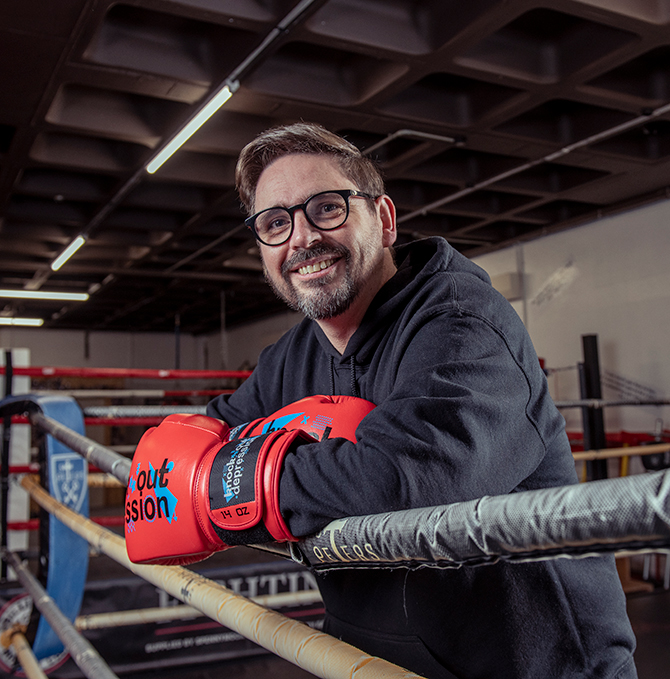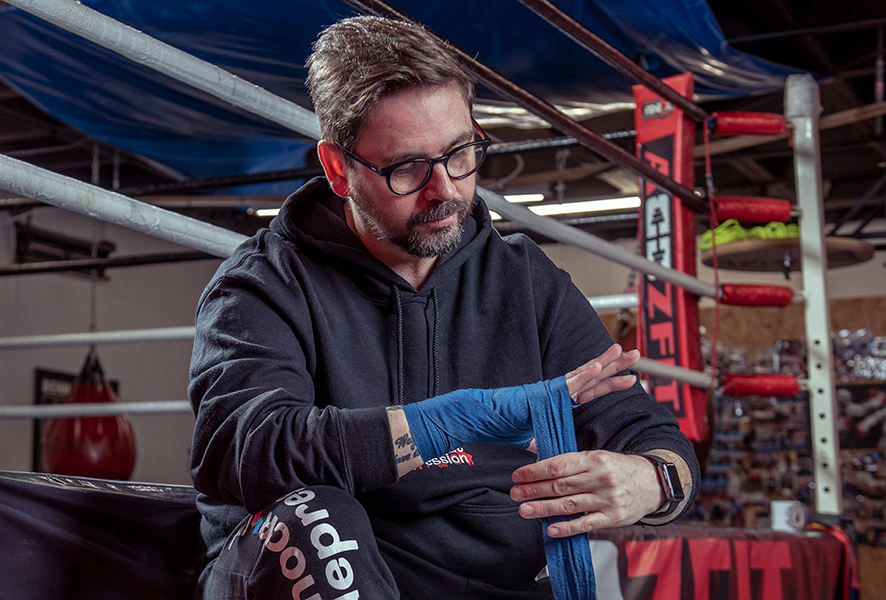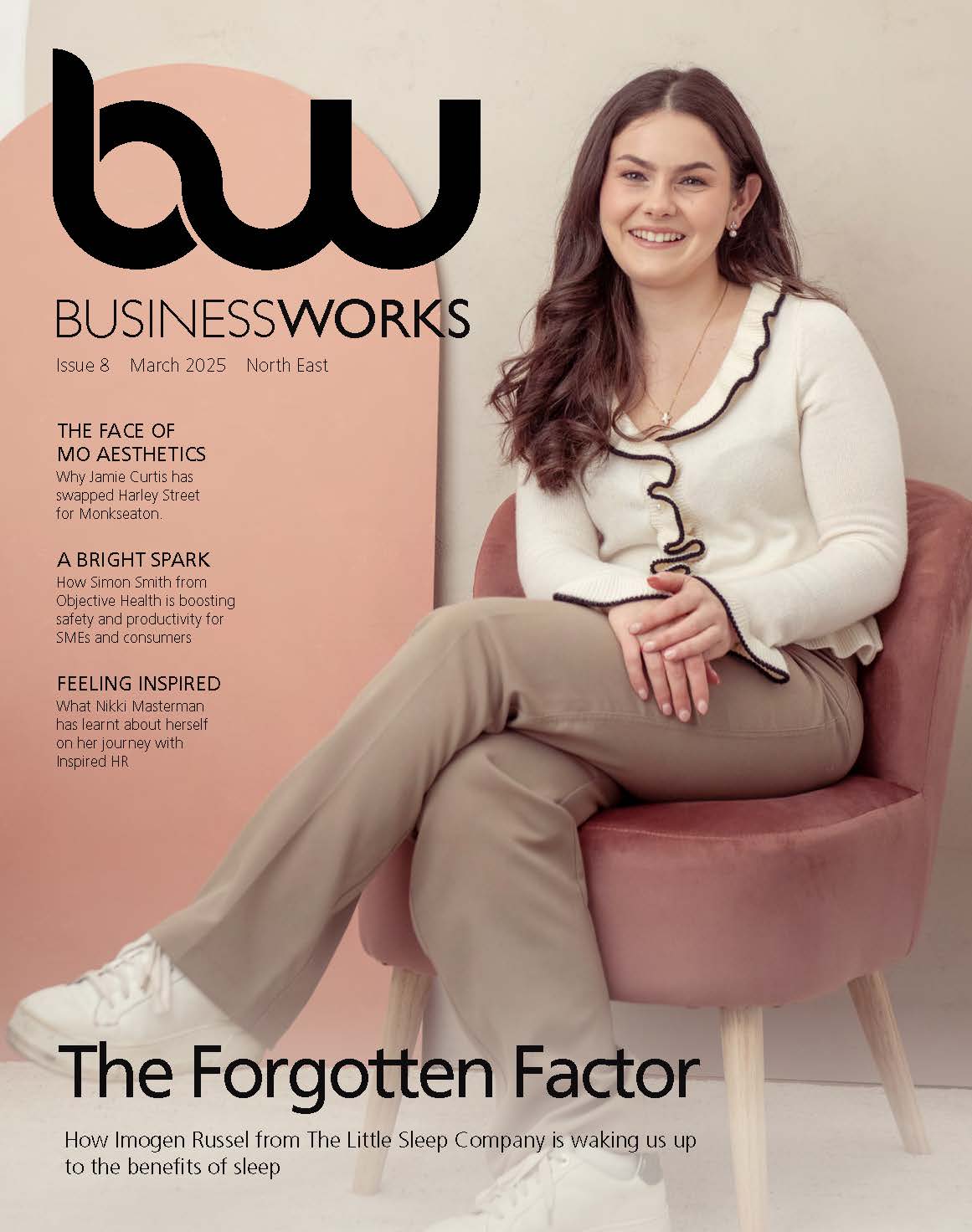Having experienced depression three times, Matthew Williams knows how difficult it is to think clearly when each day feels like you’re in a 12-round bout with Tyson Fury, getting pummelled mercilessly around the head. But this passionate boxing fan has turned such an analogy into mental health programmes that provide practical support while fighting stigma. Here, he talks to Alison Cowie about Knock Out Depression.
Matthew Williams was always drawn to sport and he spent his youth running competitively for his local athletics club. But it was the dynamic world of boxing that most appealed to the youngster from Middlesbrough.
“Boxing has been my passion since I watched Rocky II one Christmas,” Matthew reveals. “I was about ten years old and I became obsessed. It wasn’t about doing boxing. I was a runner, not a scrapper. But I was attracted to the people and the characters. I read everything I could about it and am a life-long follower.”
Matthew’s sporting passion influenced his career and he was a sports development officer for London Borough of Barnet Council before moving to North Yorkshire to work at a local county sports partnership.
In 2006, as a newly married man, Matthew was set to start a new chapter in his life. But at that moment depression put this go-getter on the proverbial canvas for months.
“I couldn’t smile, laugh or feel happy,” he recalls. “I had no idea what was happening to me. “I had physical symptoms too, and they got worse and worse. It was horrific.
“I remember Frank Bruno in the press for his mental health struggles and Marcus Trescothick talking about breaking down at an airport on the way to a cricket tour. But I didn’t know anyone in real life going through something I was.
“I was in the grip of something I didn’t understand and didn’t know how to get out of it.”
Matthew’s depression forced him to take an extended sickness absence from work and he was afraid he’d never be able to return. He was too scared to take medication and felt he needed to beat the illness on his own.
The heavy punches of depression, however, continued to rain down daily until
Matthew knew he needed to seek meaningful help.
“I eventually paid to see a psychologist. It was a major step because, at the time I felt I needed to keep as much money as I could because I’d never work again. I was worried I’d end up homeless.”
Despite initial scepticism, Matthew describes working with the psychologist as a turning point and he was able to take his first steps to recovery. He returned to his career and took a position at England Boxing, where he could indulge his sporting obsession by working in club and coach development.
Matthew’s daughter was born in 2006 and his son in 2011 but sadly his marriage did not last and eventually broke down in 2014. He feared his crippling depression might return during such a turbulent time, but it didn’t.
“One of the misconceptions people have about depression is that people can’t manage difficult things. But I didn’t go through depression during my divorce, which is one of the most stressful life events you can go through.
“This idea that people who have suffered from depression can’t cope is rubbish.”
A year after his divorce, Matthew began writing a blog to help him manage the complex emotions he was feeling.
“I just had a compulsion to start writing,” he reflects. “I got a blogging app and within a couple of hours I put my first 700-word post out. It just poured out of me.
“I found it helped me process what I was going through and enabled me to find positives and lessons.”
The blog soon garnered a dedicated fanbase which led to a book – Something Changed: Stumbling Through Divorce, Dating and Depression – being published by Sixth Element.
“Because depression is such an alien thing, it can be so difficult to articulate. So finding that I could write about it, in a way that people could relate to, was very powerful,” the published author adds.
Matthew has suffered two subsequent bouts of depression in 2013 and 2019, but each time he has felt better prepared for the fight.
“I’ve learnt about myself and what works for me,” he explains. “I’ve been able to recognise some of the roots of what I believe triggers me.”
Despite his experience, Matthew does not prescribe to the idea that he lives with depression.
“I’ve had it three times in the same way that I could have had flu three times. It’s a period of illness; it’s not who I am,” he maintains.
“A lot of people think depression is a fault within them. They think it’s a life sentence but that’s not the case.
“Looking after your mental health is something that we all have to do in the same way as our physical health.”
While at England Boxing, Matthew helped establish a mental health awareness workshop. He found boxing the perfect metaphor for managing mental health.
“People misunderstand boxing is about violence and aggression,” he explains. “But it’s more an intense physical and mental competition, one on one.
“That will to win and overcome adversity is a very human thing and that’s why I use it as a way to help people understand mental health while challenging some of the negative stereotypes.”
In March 2022, after working for a mental health charity, Matthew decided to leave full-time employment to develop and deliver his own mental health support programme with boxing at its heart. He named his new venture, Knock Out Depression.
Matthew developed a six-week programme that combined mental health education with boxing training.
He set up a website and on the first day received more than 70 enquiries.
Matthew teamed up with Billingham Boxing Academy to deliver his sessions, which comprise an hour of boxing training followed by a discussion about ways to manage mental health.
“In boxing, it’s all about finding the right combination to beat your opponent. In mental health, it’s the same. You need to find the right combination that works for you.”
Matthew has now set his sights on working with businesses to deliver practical workplace sessions to help educate employers and employees on how to manage mental health and support those struggling.
Initially, he is targeting traditionally male-dominated industries such as manufacturing, engineering and construction.
“A big problem is that men don’t think depression will happen to them until it does,” Matthew explains. “If they’ve never been there and you come into their workplace and start talking to them about mental health, it goes over their heads. But if I get them in boxing gloves and moving around, I can then use boxing by saying it’s not about punching, it’s all about getting your balance right. It’s the same in life. You’ve got to balance your mental health. That’s when they make that connection.”
Matthew also sees boxing superstar Tyson Fury being open about his mental health struggles as an important factor in helping combat stigma around depression.
“It immediately challenges any notion of depression being a weakness because you’ve got a six-foot, nine-inch heavyweight champion of the world saying it brought him to his knees.
“Tyson Fury’s made his share of controversial comments but on mental health, he speaks so well and we need voices like his.”
Matthew continues to work in the community, delivering his six-week programmes at Billingham Boxing Academy and Redcar Boxing Club, where he’s worked with men and women of all ages. He has also developed an online version so that people can join virtually.
Matthew recognises the herculean effort it can take for someone struggling with their mental health to seek help, and so offers a free guide on his website introducing people to his approach. He’s also developed an online quiz to help people take their first step.
“I’ve had almost 400 responses to the quiz,” he reveals. They’re anonymous but it helps me understand what people are experiencing so I can use that to tailor the support Knock Out Depression offers.”
To help develop his Community Interest Company (CIC), Matthew has taken part in two accelerator programmes in association with Teesside University, providing him with funding, mentorship, business support and a place to base his business.
His plan is to recruit trainers to deliver his programmes to a wider audience. But this won’t happen until he is confident others can effectively translate his support.
Matthew concludes: “The main takeaway of Knock Out Depression is that I genuinely believe there are messages in boxing that can help anybody. You don’t have to be interested in the sport.
“There’s something deeply human about struggling with our mental health and boxing taps into a lot of what it takes to be human – that vulnerability and courage.
“It hits the mark in so many ways.”
For more information visit www.knockoutdepression.co.uk





